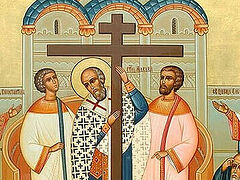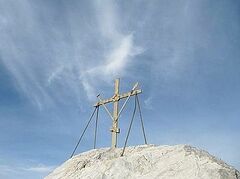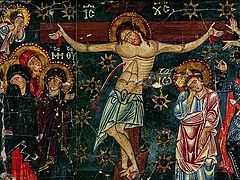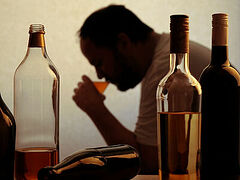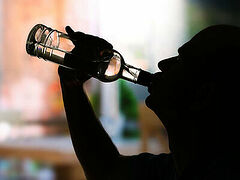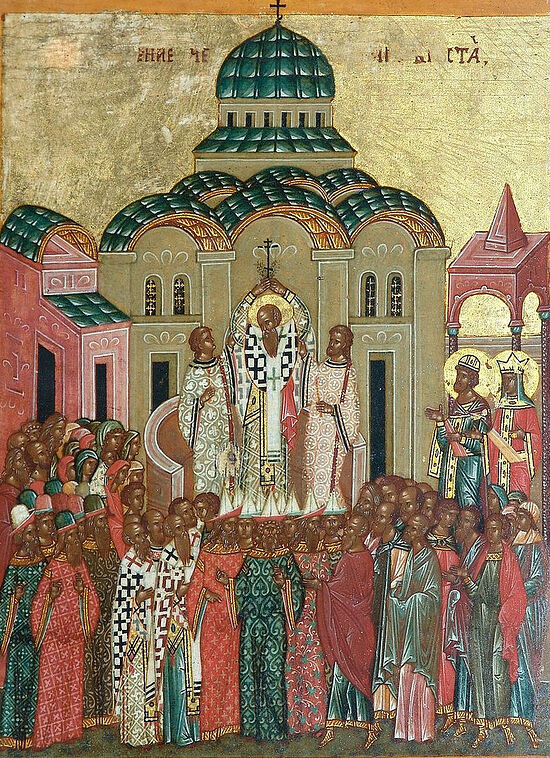 Photo: Pinterest
Photo: Pinterest
Today the holy Church festively commemorates the finding of the Precious Cross of the Lord. This joyous event came, as we know, three centuries after the Resurrection of the Lord, and was accomplished by the zeal of the holy Queen Helen, the mother of the Equal-to-the-Apostles Emperor Constantine. The Lord entered into His glory by a long and difficult path of humility, and the humiliation of the Life-Giving Tree, upon which the Lord offered Himself as a sacrifice for our sins, continued incomparably longer.
The Savior of the world was already in Heaven, and the instrument of salvation was held in the bowels of the earth; the glory of the Crucified One was already proclaimed to all ends of the universe, but no one knew about the Tree of the Cross, even in those areas around Golgotha itself. But now the world began to be persuaded that the preaching of the Cross is to them that perish foolishness; but unto us which are saved it is the power of God (1 Cor. 1:18), and the Tree of the Cross needed to be revealed to the world for its joy, for the exaltation and adornment of the Church.
St. Constantine the Great, himself having experienced the power of the Cross several times over, set out to find the very Tree upon which our Savior was crucified. This sacred work was undertaken by his praiseworthy mother, Empress Helen. The Holy Spirit inspired this Equal-to-the-Apostles Queen to make every effort to zealously seek to recover the Cross. But how to find this treasure? On the advice of Patriarch Macarius of Jerusalem, the oldest Jews were convened, and when they were asked where their ancestors hid the Cross of Christ, they pointed to a certain Judas, who, having brought the Queen and Archbishop to the northeastern side of Golgotha, told them: “On this place, where stands the Temple of Venus, you’ll find the Cross of your Christ.”
The temple was razed to the ground, and after much work—since the Cross was covered with earth and garbage—the Cross of the Savor—and with it the crosses of the thieves who were crucified with the Lord—were found. Even before they were found, a sweet fragrance could be smelled coming out of the ground. But since three crosses were found, Patriarch Macarius ordered that a sick, pious woman, lying on her deathbed be placed on the crosses to determine which was the Cross of the Lord. When she was placed on the first two crosses, they didn’t affect any kind of change in her suffering state, but touching the third one not only raised her from her sickbed, but also gave her more strength than she possessed before. After that, giving glory to God, everyone unanimously recognized the wonderworking cross as the Cross of the Lord.
But that wasn’t enough. The providence of God was pleased to glorify the power of the Cross yet more, so that even its enemies would believe in it. A dead man was being carried past the house where the sick woman lay. And the Patriarch again laid the three crosses on the dead man, one after the other. When the Cross of the Savior was placed on him, there occurred a miracle: The dead man was resurrected, so that even the enemies of the Church of Christ from among the Jews themselves came to believe. All those present wanted to prostrate themselves before the Cross and kiss it, but the cramped space and the large gathering of people didn’t allow for it. Then they started asking to at least be shown the Tree of the Cross.
Standing on an elevated place, St. Macarius lifted up the Precious Tree, and the people, seized by reverent joy exclaimed: “Lord, have mercy!” Therefore, the remembrance of this glorious event received in our Church the name of the Exaltation of the Precious Cross of the Lord. Judas, who suggested where to find the Cross, came to believe in the crucified Lord, was baptized with the name Cyriacus, and later became the Patriarch of Jerusalem and died a martyr’s death.
The power of the Life-Giving Cross of the Lord gives the greatest help to those who protect themselves with the Sign of the Cross. “The Cross is the sign of our salvation, the common freedom and mercy of our Lord,” St. John Chrysostom says about it. This sign, both in former and present times, has opened closed doors, deprived harmful substances of their power, rendered poisons ineffective, and healed those bitten by deadly animals. For if it opened the gates of hell, opened the door of Heaven, again opened the entrance to Paradise, and crushed the power of the devil, then what’s to marvel about if it defeats the power of poisonous substances, animals, and the like?
Indeed, the Sign of the Cross has great power. Once there was a Bishop Julian, a monk, in the city of Bostra in Arabia. Some of the residents of the city, enemies of Christ, wanted to poison him. They bribed a young servant to mix some poison into the cup when he next served Bishop Julian a drink. As they taught him, so he did, and he served St. Julian the poisoned cup. But he found out about the treachery, and taking the cup, he placed it in front of himself, saying nothing to the young man. Then he called together all the citizens of the city, including the perpetrators, and not wanting to denounce them, said to everyone: “If you’re thinking of poisoning humble Julian, then I’ll drink it in front of you.” He made the Sign of the Cross three times over the cup, saying: “In the name of the Father and of the Son and of the Holy Spirit, I drink this cup,” and having drunk it in front of everyone, he remained unharmed. The plotters saw this, and they fell to the ground begging forgiveness.
Having witnessed numerous miracles manifesting the power of the Cross of Christ, St. Dmitry of Rostov says in his word on the Exaltation:
It is meet and right to venerate the Cross of Christ, for by this blessed Tree, death was put to death and life was granted. By the Tree of Paradise we were slain, but by the Tree of the Cross we were quickened; by the first we were expelled from Paradise, by the second we ascend to Heaven; the enemy defeated us by the first, we defeat our enemies by the second; therefore, this blessed Tree is worthy of all veneration. If the weapon with which David beheaded Goliath was kept in great honor in Solomon’s Temple, then the weapon of the Cross, by which Christ defeated not a man, but the devil, this infernal Goliath with all his hosts, is all the more worthy of honor and veneration. Before the coming of Christ, the demons had power, because people had no weapons to resist them, but now there is the Cross of Christ; simply make the Sign of the Cross on yourself, and they’ll immediately flee from you. He’s bound by the power of the Cross, and if he’s bound, then how can he harm you? If he hurts you, you yourself bind him—that is, make the Sign of the Cross of the Lord over yourself, and he’ll be bound. Does the devil put evil thoughts into your mind? Make the Sign of the Cross on your forehead, and he’ll flee from you. Does he force you to turn your eyes here and there? Make the Sign of the Cross on your forehead, and he’ll depart from you. Does he make your tongue to spout off? Banish him with the Cross. Does he carry the vain words of others to your ears? Protect your hearing with the Cross of Christ.
This is also advised by St. John of Damascus, who says: “The Cross is given to us as a sign on our forehead, just as circumcision was given to Israel. We the faithful are distinguished from the infidels by the Cross; we’re marked with the Cross; the Cross is a shield, weapon, and victory over the devil; it’s a seal so that the destroyer can’t touch us.”
Dear brothers and sisters, in venerating the Cross of the Lord, we must take care that our external veneration is an expression of our inner spiritual worship before the Savior. It will be salvific for us if it serves as an expression of our sincere and reverent faith in the crucified Lord. Jesus Christ crucified on the Cross is our Savior and God; the Cross is the banner of our victory and Christian faith. We humbly bow our knees and our mind before this sign, venerating the incomprehensible wisdom of God and highest mystery of God’s love for mankind. We must always confess our faith in the Lord crucified for us, remembering the words of the Savior: Whosoever therefore shall confess Me before men, him will I confess also before My Father Which is in Heaven (Mt. 10:32).
Dear brothers and sisters, knowing the power of the Lifegiving Cross and that the Lord suffered for our sins so we could live for truth, let us try to live piously, in the truth of God, otherwise we’ll be subject to terrible punishment not only for our sins, but also for trampling on the Blood of the Son of God. May it not be so with us. On the contrary, let us be filled with a sense of gratitude to the Lord and with true filial devotion and love, let us fall down before this Cross, kissing the Savior depicted on it and crying out: Before Thy Cross we bow down in worship, O Master, and Thy holy Resurrection we glorify!
Amen.


